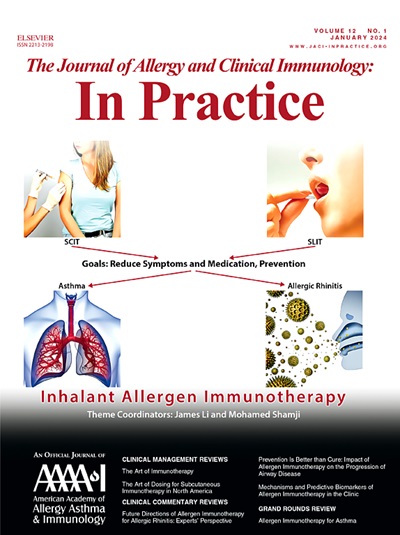比较皮肤和血清测试与直接挑战β-内酰胺过敏儿童的结果。
IF 6.6
1区 医学
Q1 ALLERGY
Journal of Allergy and Clinical Immunology-In Practice
Pub Date : 2024-11-01
DOI:10.1016/j.jaip.2024.08.023
引用次数: 0
摘要
背景:很少有前瞻性研究调查皮肤点刺和皮内试验、血清特异性免疫球蛋白 E 和扩展口服挑战在诊断报告的β-内酰胺过敏儿童中的相对作用:目的:确定皮肤测试和血清特异性免疫球蛋白 E 在β-内酰胺过敏儿童中的敏感性和特异性:一项开放标签的前瞻性研究招募了四百名由家长报告的β-内酰胺过敏儿童。研究人员收集了详细的过敏史资料。经医学观察并记录有过敏性休克病史、需要肾上腺素或 SCAR 的儿童被排除在外。共有 380 名儿童接受了所有测试方式和直接激发试验。每个儿童都接受了至少三年的随访:结果:儿童真正的过敏并不常见,8%-3% 的儿童对直接激发试验或 5 天延长口服激发试验有反应。对头孢菌素过敏或一年内出现过过敏反应的儿童更有可能对直接激发试验产生反应。皮试的敏感性、特异性和阳性预测值分别为:直接激发试验结果的 12-5%、98-8% 和 20-0%;延长激发试验结果的 4-76%、99-0% 和 25-0%;两种激发试验结果的 6-9%、99-0% 和 40-0%。后续调查显示,5%-7% 的儿童有轻微的重复反应,2%-7% 的儿童在成功脱标后仍继续回避罪魁祸首。再次入院治疗的儿童中,再次标签率为 15%,且再次标签没有依据:结论:真正的β-内酰胺过敏很少见,90% 以上的儿童能有效解除标签。无论病史如何,皮肤和血清特异性免疫球蛋白 E 测试都不能帮助诊断儿童对β-内酰胺类抗生素过敏。事实证明,扩展口服挑战对确认过敏和增强家长的信心很有价值。本文章由计算机程序翻译,如有差异,请以英文原文为准。
Comparing Skin and Serum Testing to Direct Challenge Outcomes in Children With β-Lactam Allergies
Background
There is a scarcity of prospective studies investigating the relative roles of skin prick and intradermal testing, serum specific IgE, and extended oral challenges in diagnosing children with reported β-lactam allergies.
Objective
To determine the sensitivity and specificity of skin testing and serum specific IgE in children with β-lactam allergies, with immediate and nonimmediate historic reactions.
Methods
Four hundred children with parent-reported β-lactam allergies were recruited into an open-label prospective study. Detailed allergy histories were collected. Those with medically observed and documented histories of anaphylaxis, requiring epinephrine, or severe cutaneous adverse reactions were excluded. In total, 380 children underwent all testing modalities and a direct provocation test. Each child was followed up for a minimum of 3 years.
Results
True allergy in children was uncommon; 8.3% reacted to the direct provocation challenge or the 5-day extended oral provocation challenge. Children reporting cephalosporin allergy or a reaction within 1 year were more likely to react to direct provocation testing. The sensitivity, specificity, and positive predictive value of skin testing were 12.5%, 98.8%, and 20.0% for direct challenge outcomes, 4.76%, 99.0%, and 25.0% for extended challenge outcomes, and 6.9%, 99.0%, and 40.0% for both challenges combined, respectively. Follow-up investigations revealed that 5.7% of children had a mild repeat reaction and 2.7% continued to avoid the culprit despite successful delabeling. The relabeling rate for children readmitted to hospital was 15%, with the relabeing being unfounded.
Conclusions
Genuine β-lactam allergies were rare, with over 90% of children effectively delabeled. Skin and serum specific IgE testing did not aid the diagnosis of β-lactam antibiotic allergy in children, regardless of medical history. Extended oral challenges proved valuable in confirming allergies and boosted parental confidence.
求助全文
通过发布文献求助,成功后即可免费获取论文全文。
去求助
来源期刊

Journal of Allergy and Clinical Immunology-In Practice
ALLERGYIMMUNOLOGY-IMMUNOLOGY
CiteScore
11.10
自引率
9.60%
发文量
683
审稿时长
50 days
期刊介绍:
JACI: In Practice is an official publication of the American Academy of Allergy, Asthma & Immunology (AAAAI). It is a companion title to The Journal of Allergy and Clinical Immunology, and it aims to provide timely clinical papers, case reports, and management recommendations to clinical allergists and other physicians dealing with allergic and immunologic diseases in their practice. The mission of JACI: In Practice is to offer valid and impactful information that supports evidence-based clinical decisions in the diagnosis and management of asthma, allergies, immunologic conditions, and related diseases.
This journal publishes articles on various conditions treated by allergist-immunologists, including food allergy, respiratory disorders (such as asthma, rhinitis, nasal polyps, sinusitis, cough, ABPA, and hypersensitivity pneumonitis), drug allergy, insect sting allergy, anaphylaxis, dermatologic disorders (such as atopic dermatitis, contact dermatitis, urticaria, angioedema, and HAE), immunodeficiency, autoinflammatory syndromes, eosinophilic disorders, and mast cell disorders.
The focus of the journal is on providing cutting-edge clinical information that practitioners can use in their everyday practice or to acquire new knowledge and skills for the benefit of their patients. However, mechanistic or translational studies without immediate or near future clinical relevance, as well as animal studies, are not within the scope of the journal.
 求助内容:
求助内容: 应助结果提醒方式:
应助结果提醒方式:


